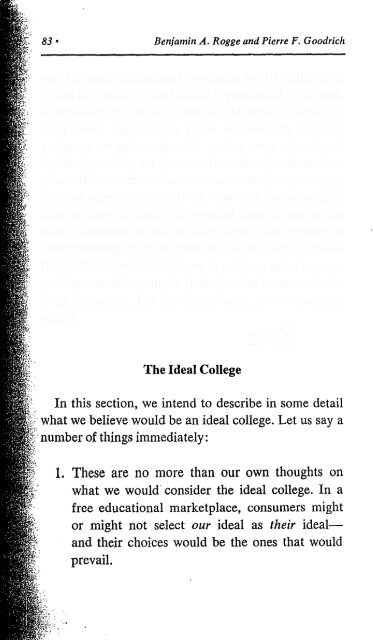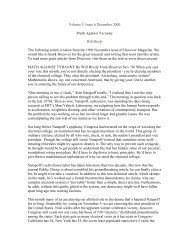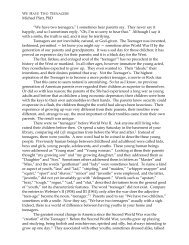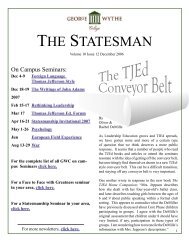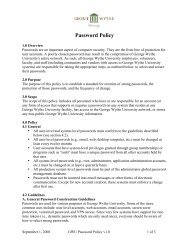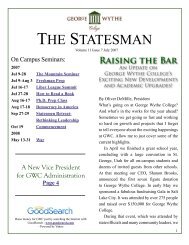1. These are no more than our own thoughts on what we would ...
1. These are no more than our own thoughts on what we would ...
1. These are no more than our own thoughts on what we would ...
- No tags were found...
You also want an ePaper? Increase the reach of your titles
YUMPU automatically turns print PDFs into web optimized ePapers that Google loves.
83·Benjamin A. Rogge and Pierre F. Goodrichpay for such educati<strong>on</strong>al programs for its children asit sees fit-whether that which is purchased be a book,a televisi<strong>on</strong> set, or f<str<strong>on</strong>g>our</str<strong>on</strong>g> years at Harvard College. Leteach adult, again using funds acquired by peacefulexchange or gift, make his or her <str<strong>on</strong>g>own</str<strong>on</strong>g> educati<strong>on</strong>aldecisi<strong>on</strong>s, acting <strong>on</strong> them in the educati<strong>on</strong>al marketplace.If freedom of choice is desirable for individualsin most aspects of their lives, why is it <str<strong>on</strong>g>no</str<strong>on</strong>g>t imperativethat freedom of choice be granted them in <strong>on</strong>e of themost important aspects of their lives: their growth inunderstanding of themselves and of the world around;, them? To the collectivists <strong>we</strong> say, if you insist <strong>on</strong> c<strong>on</strong>-'trolling something, make it the peanut-butter or hulahoopindustries, but for God's sake, leave educati<strong>on</strong>al<strong>on</strong>e!The Ideal CollegetV-c)In this secti<strong>on</strong>, <strong>we</strong> intend to describe in some detaili: <strong>what</strong> <strong>we</strong> believe <strong>would</strong> be an ideal college. Let us say a"number of things immediately:<str<strong>on</strong>g>1.</str<strong>on</strong>g> <str<strong>on</strong>g>These</str<strong>on</strong>g> <str<strong>on</strong>g>are</str<strong>on</strong>g> <str<strong>on</strong>g>no</str<strong>on</strong>g> <str<strong>on</strong>g>more</str<strong>on</strong>g> <str<strong>on</strong>g>than</str<strong>on</strong>g> <str<strong>on</strong>g>our</str<strong>on</strong>g> <str<strong>on</strong>g>own</str<strong>on</strong>g> <str<strong>on</strong>g>thoughts</str<strong>on</strong>g> <strong>on</strong><strong>what</strong> <strong>we</strong> <strong>would</strong> c<strong>on</strong>sider the ideal college. In afree educati<strong>on</strong>al marketplace, c<strong>on</strong>sumers mightor might <str<strong>on</strong>g>no</str<strong>on</strong>g>t select <str<strong>on</strong>g>our</str<strong>on</strong>g> ideal as their idealandtheir choices <strong>would</strong> be the <strong>on</strong>es that <strong>would</strong>prevail.'..
Educati<strong>on</strong> in a Free Society·8485·Benjamin A. Rogge and Pierre F. Goodrich2. The criteri<strong>on</strong> of "ideal" <strong>we</strong> <str<strong>on</strong>g>are</str<strong>on</strong>g> using is this:Does this arrangement maximize the likelihoodthat those who <str<strong>on</strong>g>are</str<strong>on</strong>g> exposed to it will come to becommitted to the free society and, equally important,come to k<str<strong>on</strong>g>no</str<strong>on</strong>g>w and understand precisely<strong>what</strong> they <str<strong>on</strong>g>are</str<strong>on</strong>g> for and against and why? In otherwords, <strong>we</strong> <str<strong>on</strong>g>are</str<strong>on</strong>g> <str<strong>on</strong>g>no</str<strong>on</strong>g>t interested in the purely emoti<strong>on</strong>al,unreas<strong>on</strong>ing c<strong>on</strong>vert to <str<strong>on</strong>g>our</str<strong>on</strong>g> point of view.Some might wish to argue that <strong>what</strong> <strong>we</strong> <str<strong>on</strong>g>are</str<strong>on</strong>g> proposingis a propaganda mechanism, <str<strong>on</strong>g>no</str<strong>on</strong>g>t an educati<strong>on</strong>alprogram. To this <strong>we</strong> <strong>would</strong> make two replies: First, inthe sense that there <str<strong>on</strong>g>are</str<strong>on</strong>g> <str<strong>on</strong>g>no</str<strong>on</strong>g> truly "objective" teachersor collecti<strong>on</strong>s of teachers, all educati<strong>on</strong>al instituti<strong>on</strong>shave some kind of planned or unplanned slant or pointof view. For example, most of the so-called places of"true learning" in this country today <str<strong>on</strong>g>are</str<strong>on</strong>g>, in fact,dominated by the philosophies of the left and, hence,giant factories of left-wing thought and opini<strong>on</strong>. Ourpositi<strong>on</strong> <strong>would</strong>. be openly decl<str<strong>on</strong>g>are</str<strong>on</strong>g>d, for all to k<str<strong>on</strong>g>no</str<strong>on</strong>g>w,rather <str<strong>on</strong>g>than</str<strong>on</strong>g> c<strong>on</strong>cealed under the guise of objectivity.Sec<strong>on</strong>d, it is <str<strong>on</strong>g>our</str<strong>on</strong>g> c<strong>on</strong>victi<strong>on</strong> that any pers<strong>on</strong> of reas<strong>on</strong>ableintelligence who studies the human experience inthe manner appropriate to true learning will probably/come to the c<strong>on</strong>clusi<strong>on</strong> that the optimal organizatio<str<strong>on</strong>g>no</str<strong>on</strong>g>f society is that of free and resp<strong>on</strong>sible men underlimited government and the rule of law. Admittedly,some may <str<strong>on</strong>g>no</str<strong>on</strong>g>t agree; certainty is r<str<strong>on</strong>g>are</str<strong>on</strong>g>ly encounteredin human affairs. Others may. agree in principle butfind the attracti<strong>on</strong>s of po<strong>we</strong>r for themselves too greatto resist. (Comp<str<strong>on</strong>g>are</str<strong>on</strong>g>, for example, the Woodrow Wils<strong>on</strong>who said, "The history of human liberty is the historyof limitati<strong>on</strong> of governmental po<strong>we</strong>r," with the WoodrowWils<strong>on</strong> in the Presidency, who added e<str<strong>on</strong>g>no</str<strong>on</strong>g>rmouslyto the po<strong>we</strong>r of government in the domestic eco<str<strong>on</strong>g>no</str<strong>on</strong>g>myand who used his positi<strong>on</strong> to bring America's entryinto a tragic foreign war. The poet Kipling reflectedsome r<str<strong>on</strong>g>are</str<strong>on</strong>g> insight in his poem "The Gods of the CopybookHeadings," published in 1919.) In other words,<strong>we</strong> believe that true growth in understanding is likelyto turn the learner's head and heart in the directio<str<strong>on</strong>g>no</str<strong>on</strong>g>f freedom; the educati<strong>on</strong>al dice do <str<strong>on</strong>g>no</str<strong>on</strong>g>t have to beloaded in <str<strong>on</strong>g>our</str<strong>on</strong>g> favor-although it may be necessarythat they <str<strong>on</strong>g>no</str<strong>on</strong>g>t be loaded against us, as they <str<strong>on</strong>g>no</str<strong>on</strong>g>w <str<strong>on</strong>g>are</str<strong>on</strong>g>.3. We have chosen the college-level kind of instituti<strong>on</strong>,<str<strong>on</strong>g>no</str<strong>on</strong>g>t because it is necessarily the most important,but because <strong>we</strong> feel that <strong>we</strong> have had<str<strong>on</strong>g>more</str<strong>on</strong>g> experience with and k<str<strong>on</strong>g>no</str<strong>on</strong>g>w <str<strong>on</strong>g>more</str<strong>on</strong>g> aboutthis kind of educati<strong>on</strong> <str<strong>on</strong>g>than</str<strong>on</strong>g> <strong>we</strong> do about, say,elementary schooling.We <strong>would</strong> add <strong>on</strong>ly that <strong>we</strong> believe the same generalprinciples <strong>would</strong> apply at all levels of true educati<strong>on</strong>alactivity. In a truly free, competitive educati<strong>on</strong>al system,<strong>we</strong> <strong>would</strong> expect a great variety of elementary andsec<strong>on</strong>dary educati<strong>on</strong>al programs to evolve, some involving.the formal classroom, others <str<strong>on</strong>g>no</str<strong>on</strong>g>t. What <strong>we</strong><strong>would</strong> expect to happen is that the young and the veryyoung <strong>would</strong> come to some level of competence in the~ ).';
Educati<strong>on</strong> in a Free Society·8687·Benjamin A. Rogge and Pierre F. Goodrichbasic skills of language and number use at an earlierage and at far less expense per pupil <str<strong>on</strong>g>than</str<strong>on</strong>g> under currentarrangements.4. We<str<strong>on</strong>g>are</str<strong>on</strong>g> restricting <str<strong>on</strong>g>our</str<strong>on</strong>g> model to <strong>what</strong> might betermed (in a very rough sort of way) the liberalarts college.We<str<strong>on</strong>g>are</str<strong>on</strong>g> <str<strong>on</strong>g>no</str<strong>on</strong>g>t c<strong>on</strong>temptuous of vocati<strong>on</strong>al training <str<strong>on</strong>g>no</str<strong>on</strong>g>rdo <strong>we</strong> deny that much vocati<strong>on</strong>al training can alsolead to true growth in general understanding in theliberal arts sense. Ho<strong>we</strong>ver, the training of doctors orelectrical engineers or lawyers need <str<strong>on</strong>g>no</str<strong>on</strong>g>t have any closerelati<strong>on</strong>ship to the questi<strong>on</strong> of freedom. Our c<strong>on</strong>cernis with those forms of educati<strong>on</strong>al activity that do seemto have a close tie to questi<strong>on</strong>s of human freedom.(Actually, <strong>we</strong> <str<strong>on</strong>g>are</str<strong>on</strong>g> c<strong>on</strong>vinced that the training of doctors,accountants, lawyers, engineers, or <strong>what</strong> haveyou, <strong>would</strong> be improved if greater general understanding<strong>we</strong>re required of them. When the accountant, forexample, encounters problems of inflati<strong>on</strong> or of politicalc<strong>on</strong>trol of his work, he stands in need, even to bea better accountant, of kinds of understanding <str<strong>on</strong>g>no</str<strong>on</strong>g>tusually taught in c<str<strong>on</strong>g>our</str<strong>on</strong>g>ses in accounting. )The Structure of the College 'The college <strong>would</strong> be private, of c<str<strong>on</strong>g>our</str<strong>on</strong>g>se, with <str<strong>on</strong>g>own</str<strong>on</strong>g>ershipand, hence, c<strong>on</strong>trol residing in a specified perso<str<strong>on</strong>g>no</str<strong>on</strong>g>r group of pers<strong>on</strong>s. Note: Many of the problems oftoday's colleges and universities flow from the ambiguousnature of <str<strong>on</strong>g>own</str<strong>on</strong>g>ership and, hence, c<strong>on</strong>trol. Withstudents, faculty members, alumni, administrators,board members, taxpayers, do<str<strong>on</strong>g>no</str<strong>on</strong>g>rs, and the generalpublic all laying claim to some authority, it is <str<strong>on</strong>g>no</str<strong>on</strong>g>w<strong>on</strong>der that it is sometimes difficult to determine whoreally is in charge.The firm could be for-profit or <str<strong>on</strong>g>no</str<strong>on</strong>g>t-for-profit, with<str<strong>on</strong>g>our</str<strong>on</strong>g> preference being for the former.All decisi<strong>on</strong>s of policy <strong>would</strong> be made by the boardand implemented by the administrati<strong>on</strong>. As in anysuccessful firm, customer (student) and employee(faculty) opini<strong>on</strong> and resp<strong>on</strong>ses <strong>would</strong> be made a partof the general informati<strong>on</strong> <strong>on</strong> which policymaking decisi<strong>on</strong>s<strong>would</strong> be based, but in <str<strong>on</strong>g>no</str<strong>on</strong>g> case <strong>would</strong> anyambiguity about the locati<strong>on</strong> of final authority bepermitted.Pers<strong>on</strong>nel Policies and PracticesFaculty members <strong>would</strong> be selected for their promiseas teachers, iIi the sense of enc<str<strong>on</strong>g>our</str<strong>on</strong>g>aging and c<strong>on</strong>tributingto growth in understanding in others.The greater part of them (perhaps all) <strong>would</strong> bemen and women who <str<strong>on</strong>g>are</str<strong>on</strong>g> also deeply committed to thephilosophy of the free society: If <strong>we</strong> believe (as <strong>we</strong> do)that the outcome of true learning is likely to be such acommitment, then it <strong>would</strong> be inc<strong>on</strong>sistent of us toseek to find true scholars and teachers am<strong>on</strong>g those <str<strong>on</strong>g>no</str<strong>on</strong>g>t
Educati<strong>on</strong> in a Free Society·8889·Benjamin A. Rogge and Pierre F. Goodrichso committed. Ho<strong>we</strong>ver, in recogniti<strong>on</strong> of <str<strong>on</strong>g>our</str<strong>on</strong>g> <str<strong>on</strong>g>own</str<strong>on</strong>g>fallibility and of the resp<strong>on</strong>ses of students to <strong>what</strong>seem to be loaded dice, it might <str<strong>on</strong>g>no</str<strong>on</strong>g>t be inappropriatefor the faculty to include some who <str<strong>on</strong>g>are</str<strong>on</strong>g> critics of thefree society.Faculty members <strong>would</strong> serve at the pleasure of theadministrati<strong>on</strong>, with <strong>on</strong>ly such recogniti<strong>on</strong> of time inservice as is usuaily appropriate in any organizati<strong>on</strong>.The income of faculty members <strong>would</strong> be directlyrelated to their effectiveness in serving the purposes ofthe college. In effect, if they failed to attract studentsto their lectures or their seminars, or if <str<strong>on</strong>g>no</str<strong>on</strong>g>thing educati<strong>on</strong>alseemed to happen to those who did so attend, theman <strong>would</strong> be fired, or his salary <str<strong>on</strong>g>no</str<strong>on</strong>g>t increased, or.<strong>what</strong> have you. (An alternative arrangement <strong>would</strong> befor the greater part of faculty income to be in the formof student fees paid directly to them, after studentshave paid the college proper a basic fee to cover overheadexpenses. 7 )The CurriculumThe educati<strong>on</strong>al program of the college <strong>would</strong>c<strong>on</strong>sist of three basic elements: (a) individual studyby students, (b) seminars <strong>on</strong> assigned readings, and(c) lectures delivered by members of the faculty (orvisitors) .7 John Fischer, "Preface to the Catalogue of Curmudge<strong>on</strong> College,"Harper's, June 1970, pp. 75-78.Students could choose am<strong>on</strong>g the alternatives availableto them, with <strong>on</strong>ly these provisos: (a) any studentwhose behavior in class or <strong>on</strong> campus created problemsfor others <strong>would</strong> be asked to leave; (b) any studentwho wished to participate in a given seminar <strong>would</strong>be expected to have read the as~~gned material. Onevidence that he had <str<strong>on</strong>g>no</str<strong>on</strong>g>t read the material, the seminarleaders <strong>would</strong> ask him to leave (or perhaps, becomean observer <strong>on</strong>ly) .For any given term, the college <strong>would</strong> publish a listof the seminars to be held and of the lectures to begiven. <str<strong>on</strong>g>These</str<strong>on</strong>g> lists <strong>would</strong> be the basis <strong>on</strong> which studentscould plan their programs. On such questi<strong>on</strong>s, studentscould c<strong>on</strong>sult couselors explicitly provided by the administratio<str<strong>on</strong>g>no</str<strong>on</strong>g>r any member of the faculty who <strong>would</strong>c<strong>on</strong>sent to serve~ Students <strong>would</strong> also be given a listof suggested books and other materials, including <str<strong>on</strong>g>no</str<strong>on</strong>g>t<strong>on</strong>ly those to be explicitly discussed in seminars butreadings that <strong>would</strong> c<strong>on</strong>tribute to the general understandingof the student. Some of the books that mightbe listed (in either category) <str<strong>on</strong>g>are</str<strong>on</strong>g> given in the LibertyFund Memorandum, Part VI.Students could c<strong>on</strong>tinue for as many terms as theywished, given proper behavior in the classroom and<strong>on</strong> campus. No degrees <strong>would</strong> be given or diplomasawarded. The college <strong>would</strong> exist to serve studentstruly seeking k<str<strong>on</strong>g>no</str<strong>on</strong>g>wledge, <str<strong>on</strong>g>no</str<strong>on</strong>g>t those seeking <strong>on</strong>ly adegree or other meaningless relics from the current.
Educati<strong>on</strong> in a Free Society·9091·Benjamin A. Rogge and Pierre F. GoodrichNeither c<str<strong>on</strong>g>our</str<strong>on</strong>g>ses <str<strong>on</strong>g>no</str<strong>on</strong>g>r teachers <strong>would</strong> be organizedby departments or divisi<strong>on</strong>s. Quite naturally, somerange of interests in the faculty <strong>would</strong> be deliberatelysought, but the artificiality of departmental lines <strong>would</strong>be avoided. Note: The fact of departmentalizati<strong>on</strong> foradministrative purposes is <str<strong>on</strong>g>no</str<strong>on</strong>g>t the great evil; it is thespirit of intellectual departmentalizati<strong>on</strong> that <strong>we</strong> <strong>would</strong>seek to avoid.The Educati<strong>on</strong>al ProcessStudents <strong>would</strong> involve themselves in reading, discussing,and listening to lectures-and <strong>we</strong> <strong>would</strong> putthem in that order, both in terms of importance and ofthe chro<str<strong>on</strong>g>no</str<strong>on</strong>g>logical order in which they should takeplace. In effect, students <strong>would</strong> be sent off to do someguided reading, then brought together for small groupdiscussi<strong>on</strong>s under trained Socratic leadership, then<str<strong>on</strong>g>more</str<strong>on</strong>g> reading and <str<strong>on</strong>g>more</str<strong>on</strong>g> discussi<strong>on</strong>. Finally, the student<strong>would</strong> be ready to .listen intelligently to lectures presented<strong>on</strong> the topics under study-then <str<strong>on</strong>g>more</str<strong>on</strong>g> discussi<strong>on</strong>,<str<strong>on</strong>g>more</str<strong>on</strong>g> reading, and so forth.Students who wished to receive an evaluati<strong>on</strong> oftheir progress could make appropriate arrangements,including payment of fees recognizing the extra workinvolved in such an evaluati<strong>on</strong>. They could writepapers or examinati<strong>on</strong>s to be read by members of thefaculty and used as the basis of evaluati<strong>on</strong>. No gradesin the usual sense of that term <strong>would</strong> be given, exceptat the request of the student or his p<str<strong>on</strong>g>are</str<strong>on</strong>g>nts (or somepers<strong>on</strong> or agency providing the student with financialassistance). We suggest this arrangement <str<strong>on</strong>g>no</str<strong>on</strong>g>t because<strong>we</strong> <str<strong>on</strong>g>are</str<strong>on</strong>g> opposed to competiti<strong>on</strong> for excellence' am<strong>on</strong>gstudents, but because the real purpose of educati<strong>on</strong> isfor each individual to make the maximum progresspossible for that pers<strong>on</strong>-for this, relative judgments<str<strong>on</strong>g>are</str<strong>on</strong>g> <str<strong>on</strong>g>no</str<strong>on</strong>g>t significant.The Student Body .The student body <strong>would</strong> be made up of those who<strong>would</strong> be attracted by this kind of educati<strong>on</strong>al programand who <strong>would</strong> be willing to pay the full cost ofparticipating in it. Without the artificial lure of degrees,college dances, and campus sit-ins, <strong>we</strong> <strong>would</strong>expect an appropriate student body to be self-selecting.In Loco P<str<strong>on</strong>g>are</str<strong>on</strong>g>ntis?The remarks made above should <str<strong>on</strong>g>no</str<strong>on</strong>g>t be taken tomean that <strong>we</strong> object to young people going to dancesor doing other things that they find enjoyable. We <str<strong>on</strong>g>are</str<strong>on</strong>g><str<strong>on</strong>g>no</str<strong>on</strong>g>t opposed to fun-<strong>we</strong> just d<strong>on</strong>'t believe that it is thebusiness of the college to organize,sp<strong>on</strong>sor, or financeit.The college <strong>would</strong> <str<strong>on</strong>g>no</str<strong>on</strong>g>t take resp<strong>on</strong>sibili~y for thegeneral lives of its students; it <strong>would</strong> <str<strong>on</strong>g>no</str<strong>on</strong>g>t serve in locop<str<strong>on</strong>g>are</str<strong>on</strong>g>ntis. Some colleges might choose to do so (for aprice), but <str<strong>on</strong>g>no</str<strong>on</strong>g>t this <strong>on</strong>e. P<str<strong>on</strong>g>are</str<strong>on</strong>g>nts who might wish to
Educati<strong>on</strong> in a Free Society·9293·Benjamin A. Rogge and Pierre F. Goodrichsee their s<strong>on</strong>s or daughters under <strong>what</strong> they <strong>would</strong>think appropriate supervisi<strong>on</strong> could undoubtedly arrangewith local families or landladies for this supervisi<strong>on</strong>to be given.We give you then Free Society College, a sample ofthe kind of school that might emerge in a free educati<strong>on</strong>almarketplace. If this particular college is <str<strong>on</strong>g>no</str<strong>on</strong>g>t toy<str<strong>on</strong>g>our</str<strong>on</strong>g> liking, you need have <str<strong>on</strong>g>no</str<strong>on</strong>g> fear that it <strong>would</strong> be the<strong>on</strong>ly kind available. We <strong>would</strong> expect every. c<strong>on</strong>ceivabletype of formal and informal educati<strong>on</strong>al programto be available at a wide range of prices. One of thegreat advantages of the eco<str<strong>on</strong>g>no</str<strong>on</strong>g>mic over the politicalmarketplace is that the majority does <str<strong>on</strong>g>no</str<strong>on</strong>g>t rule. Everymi<str<strong>on</strong>g>no</str<strong>on</strong>g>rity opini<strong>on</strong> that can be served with any hope ofprofit can and will be served.ciety. We have rejected any possibility that the idealcould involve state participati<strong>on</strong> and have argued thatthe ideal arrangements must be found within the jurisdictio<str<strong>on</strong>g>no</str<strong>on</strong>g>f the private educati<strong>on</strong>al marketplace. As anexample of the kind of school that might emerge underfreedom, <strong>we</strong> have sketched the general features of acollege program that <strong>we</strong> believe <strong>would</strong> serve the causeof its students and of the free society.It seems unlikely that the American society willmove rapidly (if at all) in the directi<strong>on</strong>s <strong>we</strong> haveindicated. But this <strong>we</strong> do k<str<strong>on</strong>g>no</str<strong>on</strong>g>w: if there <str<strong>on</strong>g>are</str<strong>on</strong>g> <str<strong>on</strong>g>no</str<strong>on</strong>g>ne inthe society who stand ready to hold out the ideal of a<str<strong>on</strong>g>more</str<strong>on</strong>g> hopeful arrangement, real progress is <str<strong>on</strong>g>no</str<strong>on</strong>g>t <strong>on</strong>lyunlikely-it is forever impossible.SummaryWe have argued in this paper that the educati<strong>on</strong>alarrangements currently in use in this country <str<strong>on</strong>g>are</str<strong>on</strong>g>grossly inefficient, inequitable, c<strong>on</strong>trary to humanrights, c<strong>on</strong>trary to human nature, and destructive ofthe society of free and resp<strong>on</strong>sible men. We havesought to c<strong>on</strong>struct a general picture of those arrangementsin educati<strong>on</strong> that <strong>would</strong> be ideal, in terms ofbeing c<strong>on</strong>sistent with the principles and practices of afree society and of tending to produce individualsk<str<strong>on</strong>g>no</str<strong>on</strong>g>wledgeable about and committed to that free so-
14'1fltn's vio/em resistance agllimt tbe Tea A.d <strong>we</strong>t witb varied reaaiom am<strong>on</strong>g tbeMistl. Tbe destructiol/ of private proper~y WilS c<strong>on</strong>demned ~y 1/I111ly A<strong>we</strong>ricallS,ht most of tbelll supported tbe principle, if <str<strong>on</strong>g>no</str<strong>on</strong>g>t tbe practice, of Bostol/'S positi<strong>on</strong>."R.tT:o/uriollary Tea" is a s<strong>on</strong>g that expressed tbe feelings of 1IIal/Y oj tbe patriots.SwrCl:: Father Kemp's Old Folks COl/cat JHuric, Bost<strong>on</strong>, n.d.Tkre was an old lady lived over tbe sea,And she was an Island Queen;tiff daughter lived off in a new country,Wirh an ocean of water ber<strong>we</strong>en.,1M old lady's pocketS <strong>we</strong>re full of gold,'But never c<strong>on</strong>tented was she,So she called <strong>on</strong> her daughter to pay hera tax,_, UJree pence a pound <strong>on</strong> her tea,. f three pence a pound <strong>on</strong> her tea..tHow moth.:r, dear mother," thedaughter replied,~I shan't do the thing that you ax;t'm willing to pay a fair price for rhe tea,till never the three penny tax.",,,",'ou shall," quoth the mather, and. reddened with rage,.for you're my <str<strong>on</strong>g>own</str<strong>on</strong>g> daughter, you see,surc 'tis quite proper the daughtershould paymother a tax <strong>on</strong> her tea,mother a tax <strong>on</strong> her tea."And so the old lady her servant called up,And packed off a budget of tea;And eager for three pence a pound, shepUt InE<str<strong>on</strong>g>no</str<strong>on</strong>g>ugh for a large family.She ordered her servants to bring homethe tax,Declaring her child should obey,Or old as she was, and almost womangr<str<strong>on</strong>g>own</str<strong>on</strong>g>,She'd half whip her life away,She'd half whip her life away.The tea was c<strong>on</strong>veyed to the daughter'Sdoor,All d<str<strong>on</strong>g>own</str<strong>on</strong>g> by the ocean's side;And the bouncing girl p<str<strong>on</strong>g>our</str<strong>on</strong>g>ed OUt everypoundIn rhe dark and boiling ride.And then she called out to the IslandQueen,"Oh, mother, dear mother," quoth she,"Y<str<strong>on</strong>g>our</str<strong>on</strong>g> tea you may have when 'tissteeped e<str<strong>on</strong>g>no</str<strong>on</strong>g>ugh,But never a tax from me,But never a tax from me."
22249.ANDREW MARVELL: "Bermudas"Andrew Marvell, <strong>on</strong>e of tbe greatest of the so-called metaph)'Sical poets of the Englishseventeenth centu7J', never visited America and probably knew nat to <str<strong>on</strong>g>no</str<strong>on</strong>g>tbing about it.Nevertheless, his "Benl1udas" expresses tbe feeling of mar~)' Englishmen who did comeas <strong>we</strong>ll as any poem of tbe time. L<strong>on</strong>g an admirer of Oliver Crom<strong>we</strong>ll, Marvell mayhal'e c<strong>on</strong>ceived "Be1711udas" while serving as tutor to Crom<strong>we</strong>ll's ward, William Dutt<strong>on</strong>,in the house ofJohn Oxenbridge, wbo had made a voyage to Benl1uda. In fact, bo<strong>we</strong>ver,several of lHarvell's other poems throw <str<strong>on</strong>g>more</str<strong>on</strong>g> light <strong>on</strong> "Bermudas" <str<strong>on</strong>g>than</str<strong>on</strong>g> int'estigatiollSinto his biograpby <strong>would</strong> probably do. He was fascinated by tbe idea of the earthlyparadise, and it is to be supposed that he could believe that New England, or Bermuda doubtless it was all <strong>on</strong>e to bim - was in some seme a new Garden of Eden bey<strong>on</strong>d thesea. In ar!)' event, a mmlbn of actual col<strong>on</strong>ists, am<strong>on</strong>g tbe7l1 such men as John Cott<strong>on</strong>and Peter Bulkeley, emertained similar views.S<str<strong>on</strong>g>our</str<strong>on</strong>g>cc:POlms, G. A. Aitkcn, cd., L<strong>on</strong>d<strong>on</strong>, n.d.rAJ BERMUDASWhere the remote Bermudas rideIn the ocean's bosom unespied,From a small boat that ro<strong>we</strong>d al<strong>on</strong>g,The listening winds received this s<strong>on</strong>g:"What should <strong>we</strong> do but sing His praise,That led us through the watery maze,Unto an isle so l<strong>on</strong>g unk<str<strong>on</strong>g>no</str<strong>on</strong>g>wn,And yet far kinder <str<strong>on</strong>g>than</str<strong>on</strong>g> <str<strong>on</strong>g>our</str<strong>on</strong>g> <str<strong>on</strong>g>own</str<strong>on</strong>g>?Where He the huge sea m<strong>on</strong>sters wracks,That lift the deep up<strong>on</strong> their backs,He lands us <strong>on</strong> a grassy stage,Safe from the storms, and prelate's rage.He gave us this eternal spring,Which here enamels everything,And sends the fowls to us in c<str<strong>on</strong>g>are</str<strong>on</strong>g>,On daily visits through the air;He hangs in shades the orange bright,Like golden lamps in a green night,And does in the pomegranates closeI f'wplli: f<str<strong>on</strong>g>no</str<strong>on</strong>g>r". r;~J... .L __ r'\He makes the figs <str<strong>on</strong>g>our</str<strong>on</strong>g> mouths to meet,And throws the mel<strong>on</strong>s at <str<strong>on</strong>g>our</str<strong>on</strong>g> feet;But apples plants of such a price,No tree could ever bear them twice;With cedars chosen by His hand,From Leba<str<strong>on</strong>g>no</str<strong>on</strong>g>n, He stores the land,And makes the hollow seas, that roar,Proclaim the ,ambergris <strong>on</strong> shore.He cast (of which <strong>we</strong> rather boast)The gospel's pearl up<strong>on</strong> <str<strong>on</strong>g>our</str<strong>on</strong>g> coast,And in these rocks for us did frameA temple where to sound His name.Oh! let <str<strong>on</strong>g>our</str<strong>on</strong>g> voice His praise exalt,Till it arrive at heaven's vault,Which, thence perhaps rebounding, mayEcho bey<strong>on</strong>d the Mexique Bay."Thus sung they, in the English boat,An holy and a cheerful <str<strong>on</strong>g>no</str<strong>on</strong>g>tejAnd all the way, to /!Uide their chiml'
2<str<strong>on</strong>g>1.</str<strong>on</strong>g>Two S<strong>on</strong>gs of the Col<strong>on</strong>istsA good example of the early native ballad, "Forefathers' S<strong>on</strong>g," which dates from around16.10, has interest as a straightforward, unromanticized account of life in tbe Englisbcol<strong>on</strong>ies in America. A <str<strong>on</strong>g>no</str<strong>on</strong>g>te in tbe Massacbusells Historical Collecti<strong>on</strong> S(~ys tbat tbe s<strong>on</strong>gwas first recorded in 1785 ''11'0111 tbe lips of an old lady at tbe advanced period ofnine~)'-six." "H'e Gatber Together" was originally a Dutcb rather <str<strong>on</strong>g>than</str<strong>on</strong>g> an English s<strong>on</strong>g,and tbe general modem impressi<strong>on</strong> tbat it bas bem sung as America's Tbanksgiving Hymnfor tbree cC11turies ma)' be incorrect, since it was probably <str<strong>on</strong>g>no</str<strong>on</strong>g>t translated into EnglishIIlltil tbe First vVoTld War. Nevertheless, the s<strong>on</strong>g is <str<strong>on</strong>g>no</str<strong>on</strong>g>w America's Tbanksgiving Hymn,and it was sung k)' tbe first Dutch settlers in A merica, wbo tbereby expressed their bopefor a betfer life in tbe new land, as <strong>we</strong>ll as tbeir gratitude for God's boun~y alrea(~ye7~joyed. It was first publisbed in Holland, in Dutch, around 1630.mFOREFATHERS' SONGNew England's an<str<strong>on</strong>g>no</str<strong>on</strong>g>yances you that <strong>would</strong> k<str<strong>on</strong>g>no</str<strong>on</strong>g>w them,Pray p<strong>on</strong>der these verses which briefly doth show them.The place where <strong>we</strong> live is a wilderness wood,Where grass is much wanting that's fruitful and good:Our mountains and hills and <str<strong>on</strong>g>our</str<strong>on</strong>g> valleys below,Being comm<strong>on</strong>ly covered with ice and with s<str<strong>on</strong>g>no</str<strong>on</strong>g>w;And when the <str<strong>on</strong>g>no</str<strong>on</strong>g>rth-<strong>we</strong>st wind with violence blows,Then every man pulls his cap over his <str<strong>on</strong>g>no</str<strong>on</strong>g>se:But if any's so hardy and will it withstand,He forfeits a finger, a foot or a hand.But when the Spring opens <strong>we</strong> then take the hoe,And make the ground ready to plant and to sow;Our corn being planted and seed being s<str<strong>on</strong>g>own</str<strong>on</strong>g>,The worms destroy much before it is gr<str<strong>on</strong>g>own</str<strong>on</strong>g>;And when it is growing, some spoil there is madeBy birds and by squirrels that pluck up the blade;And when it is come to full corn in the ear,It is often destroyed by racco<strong>on</strong> and by deer.~ 'W j~ :t:j;;.i I]:And <str<strong>on</strong>g>no</str<strong>on</strong>g>w <str<strong>on</strong>g>our</str<strong>on</strong>g> garments begin to grow thin,And wool is much wanted to card and to spin;If <strong>we</strong> can get a garment to cover without,Our other in-garments <str<strong>on</strong>g>are</str<strong>on</strong>g> clout up<strong>on</strong> clout:Our clothes <strong>we</strong> brought with us <str<strong>on</strong>g>are</str<strong>on</strong>g> apt to be torn,They need to be clouted so<strong>on</strong> after they're worn,But clouting <str<strong>on</strong>g>our</str<strong>on</strong>g> garments they hinder us <str<strong>on</strong>g>no</str<strong>on</strong>g>thing,Clouts double arc warmer <str<strong>on</strong>g>than</str<strong>on</strong>g> single whole clothing.If fresh meat be wanting to fill up <str<strong>on</strong>g>our</str<strong>on</strong>g> dish,\Ve have carrots and turnips as much as <strong>we</strong> wish:And if there's a mind for a delicale dish'I'Ve repair to the clam-banks, and there <strong>we</strong> calch fish.Instead of pottage and puddings and cuslards and pies,Our pumpkins and parsnips arc comlll<strong>on</strong> supplies;'I'Ve have pumpkins at morning and purnpkins al <str<strong>on</strong>g>no</str<strong>on</strong>g><strong>on</strong>,If il was nOI for pumpkins <strong>we</strong> should he und<strong>on</strong>e!If barley be wanting to make into mall,We must be c<strong>on</strong>tented, and lhink it <str<strong>on</strong>g>no</str<strong>on</strong>g> fault;For <strong>we</strong> can make liquor to s<strong>we</strong>eten <str<strong>on</strong>g>our</str<strong>on</strong>g> lips,Of pu mpkins and parsnips and walnut-tree chips.Now while some arc going let others be coming,For ;'vhile liquor's boiling it must have a scumming;But I will <str<strong>on</strong>g>no</str<strong>on</strong>g>t blame them, for birds of a featherBy seeking their fellows <str<strong>on</strong>g>are</str<strong>on</strong>g> flocking together.But you whom the Lord intends hither to bring,Forsake <str<strong>on</strong>g>no</str<strong>on</strong>g>t the h<strong>on</strong>ey for fear of the sting;But bring both a quiet and c<strong>on</strong>tented mind,And all needful blessings you surely will find.l~ WE GATHER TOGETHERWe gather together to ask the Lord's blessing,He chastens and hastens His will to make k<str<strong>on</strong>g>no</str<strong>on</strong>g>wn.The wicked oppressing <str<strong>on</strong>g>no</str<strong>on</strong>g>w cease to be distressing,Sing praises to His name for He forgets <str<strong>on</strong>g>no</str<strong>on</strong>g>t His <str<strong>on</strong>g>own</str<strong>on</strong>g>,Beside us to guide us <str<strong>on</strong>g>our</str<strong>on</strong>g> God with us joining,Ordaining, maintaining His kingdom divine.So from the beginning the fighting <strong>we</strong> <strong>we</strong>re winning,Thou Lord wast at <str<strong>on</strong>g>our</str<strong>on</strong>g> side and all the glory be Thine.We all do extol Thee, Thou leader triumphant,And pray that Thou still <str<strong>on</strong>g>our</str<strong>on</strong>g> defender wilt be.Let thy c<strong>on</strong>gregati<strong>on</strong> escape all tribulati<strong>on</strong>,Thy name be ever praised in ~Iory, Lord make us free.
AI.!ANNE B HAJ>STHFI·:T: Two Poems:Tb, mrl;eJI ;\7111'1';(,111 P0l'fl·$.
liking - Whm: is t-.bs<strong>on</strong>. Wythe. JdfcrIOn. Nicholas. PendlelOn, Nels<strong>on</strong>. and a<str<strong>on</strong>g>no</str<strong>on</strong>g>lherI could name? And why. if you <str<strong>on</strong>g>are</str<strong>on</strong>g>IUfficielllly impressed with y<str<strong>on</strong>g>our</str<strong>on</strong>g> danger. doyou <str<strong>on</strong>g>no</str<strong>on</strong>g>t (as New York has d<strong>on</strong>e in the case; 01 Mr. Jay) send an eXira member~~1 two. for at leaSt a certain limited time .'.~ the,reat business of the nat i<strong>on</strong> is put upo<str<strong>on</strong>g>more</str<strong>on</strong>g> respectable and happy estahlishme ..Y<str<strong>on</strong>g>our</str<strong>on</strong>g> m<strong>on</strong>ey is <str<strong>on</strong>g>no</str<strong>on</strong>g>w sinking 5 pent ad2Y in this city; and I shall <str<strong>on</strong>g>no</str<strong>on</strong>g>t surprised~ in the c<str<strong>on</strong>g>our</str<strong>on</strong>g>se of a few mal s a wtal stop, il put to the currency of it. And yet an asItmbly, a c<strong>on</strong>cert, a dinner,or supper (that. will cost £ 300 or £ 4(0) will <str<strong>on</strong>g>no</str<strong>on</strong>g>t <strong>on</strong>ly. uke men off from acting in. hut even fromI'·127.t!unklllg 0<str<strong>on</strong>g>1.</str<strong>on</strong>g> thiS llusllless. willie a great pa<str<strong>on</strong>g>no</str<strong>on</strong>g>f the officers of y<str<strong>on</strong>g>our</str<strong>on</strong>g> Army, from absolUtenecessity. arc quitting the service; and the<str<strong>on</strong>g>more</str<strong>on</strong>g> virtuous few, rather <str<strong>on</strong>g>than</str<strong>on</strong>g> do this. arcsinking by sure degrees into beggary andwant./ I again repeat to you that this is <str<strong>on</strong>g>no</str<strong>on</strong>g>t anexaggerated account. That it is an alarming<strong>on</strong>e I do <str<strong>on</strong>g>no</str<strong>on</strong>g>t deny. and c<strong>on</strong>fess to you thatel <str<strong>on</strong>g>more</str<strong>on</strong>g> real distress <strong>on</strong> account of theprcs~carances of things <str<strong>on</strong>g>than</str<strong>on</strong>g> I haved<strong>on</strong>e at any<strong>on</strong>e time since the commencementof the dispute. But it is time to bidyou <strong>on</strong>ce <str<strong>on</strong>g>more</str<strong>on</strong>g> adieu. Providence has heretoforetaken us lip when all other meansand hope scemed to he departing from 115.The Annals of America: 1778Tis Washingt<strong>on</strong>'s health loud can<str<strong>on</strong>g>no</str<strong>on</strong>g>ns should roar,And trumpets the truth should proclaim;There can<str<strong>on</strong>g>no</str<strong>on</strong>g>t be found, search all the world o'er.His equal in virtue and fame;There can<str<strong>on</strong>g>no</str<strong>on</strong>g>t be found, scarch all the world o'er,II is elJual in virtue in fame[n virtue and fame.Tis Washingt<strong>on</strong>'s health <str<strong>on</strong>g>our</str<strong>on</strong>g> hero to bless.May hea\'en look graciously d<str<strong>on</strong>g>own</str<strong>on</strong>g>;Oh! l<strong>on</strong>g Illay he live. <str<strong>on</strong>g>our</str<strong>on</strong>g> hearts to possess,And freedolll still call him her <str<strong>on</strong>g>own</str<strong>on</strong>g>;Oh! l<strong>on</strong>g may he live, <str<strong>on</strong>g>our</str<strong>on</strong>g> hearts to possess.And freedom still call him her <str<strong>on</strong>g>own</str<strong>on</strong>g>Still call him her <str<strong>on</strong>g>own</str<strong>on</strong>g>.FRANCiS HOPKINSONTwo Patriotic S<strong>on</strong>gsmLET TYRANTS SHAKE tCi-IESTER)Tn the minds of patriots. (;etlrge Wasbingt<strong>on</strong> inevitably buame Ibe living embodiment ofthe American cause and Ibe lllliural sulUecl for Ulal~}1 s<strong>on</strong>gs. Several rousing (ij' <str<strong>on</strong>g>no</str<strong>on</strong>g>l VClYgraceful) s<strong>on</strong>gs about Wasbingt<strong>on</strong> <strong>we</strong>re wrilten by bis Fiend Francis Hopkins<strong>on</strong>. anauthor and musidan and J;'lber of the composer of "HI/il Columbia!" Tbe "Toasl toWashingl<strong>on</strong>" reprill/ed bere is a good example of tbe elder Hopkil/S<strong>on</strong>'s work. WilliamBillings was a singing masler and composer of bYllIl/S; after aboul 1775 bis prodUCliol/Stook <strong>on</strong> a decidedly palriolic le<str<strong>on</strong>g>no</str<strong>on</strong>g>r. "Lei Tyrants Sbake" (also k<str<strong>on</strong>g>no</str<strong>on</strong>g>wn as "Cbesler") wasIhe 1IIosi popular of bis p,lIriOlic J~)lmllS; il follo<strong>we</strong>d Ibe soldiers 10 camp and beCtlme Ilfavorite of Ibe fife and drum (Orps.S<str<strong>on</strong>g>our</str<strong>on</strong>g>ce:"A Favorite New Patriotic S<strong>on</strong>g in llo<str<strong>on</strong>g>no</str<strong>on</strong>g>r of Washingt<strong>on</strong>. To Which Is Added A TumWeillen and COl1lposed hy f. Ilopkins<strong>on</strong>. Es'l.... Philadelphia, 1799.[William 8illings) Tbt Singing Ma,ttT', i1"i'talll or Kty to PracticalMusic. rIC., tIC., 8oslOn, 1778.mA TOAST'Tis Washingt<strong>on</strong>'s health fill a bumper all round,For he is <str<strong>on</strong>g>our</str<strong>on</strong>g> glory and pride;Our arms shall in battle with c<strong>on</strong>quest be cr<str<strong>on</strong>g>own</str<strong>on</strong>g>ed\Vhilst virtue and he's <strong>on</strong> <str<strong>on</strong>g>our</str<strong>on</strong>g> side;Our arms shall in battle with coIHjuest be cr<str<strong>on</strong>g>own</str<strong>on</strong>g>ed\Vhilst virtuc and hc's <strong>on</strong> <str<strong>on</strong>g>our</str<strong>on</strong>g> sideAnd he's <strong>on</strong> <str<strong>on</strong>g>our</str<strong>on</strong>g> sidc.Let tyrants shake their ir<strong>on</strong> rod,And slavery clank her galling chains,vVe fear them <str<strong>on</strong>g>no</str<strong>on</strong>g>t, <strong>we</strong> trust in God.New England's God forever reigns.Ho<strong>we</strong> and Burgoyne and Clint<strong>on</strong> too.With Prescott and Cornwallis joined.Together plot <str<strong>on</strong>g>our</str<strong>on</strong>g> overthrowIn <strong>on</strong>e infernal league combined.When God inspired us for the fight.Their ranks <strong>we</strong>re broke, their lines <strong>we</strong>re forced.Their ships <strong>we</strong>re shattered in <str<strong>on</strong>g>our</str<strong>on</strong>g> sight.Or swiftly driven from <str<strong>on</strong>g>our</str<strong>on</strong>g> coast.The foe comes <strong>on</strong> with haughty stride.Our troops advance with martial <str<strong>on</strong>g>no</str<strong>on</strong>g>ise.Their veterans nee before <str<strong>on</strong>g>our</str<strong>on</strong>g> youth.And generals yield to beardless boys.What grateful offering shall <strong>we</strong> bring.What shall <strong>we</strong> render to the Lord?Loud Hallelujahs let us sing,And praise II is name <strong>on</strong> every chord.\VIl.IIAM BIU.1NGS
117."Johnny Has G<strong>on</strong>e for a Soldier"In <strong>on</strong>e form or a<str<strong>on</strong>g>no</str<strong>on</strong>g>tber tbe feelings expressed by tbe following s<strong>on</strong>g must bave beensbaud b)' tbousands ofyoung girls in every war in histor)', "Johnny Has G<strong>on</strong>e fora Soldier," a lament of <strong>on</strong>e girl a soldier left bebim/, is said to date from the America"Revoluti<strong>on</strong>.mJo'HNNY HAS GONE FOR A SOLDIERHere I sit <strong>on</strong> Buttermilk Hill,Who could blame me cry me fill?And every tear <strong>would</strong> turn a mill;Johnny has g<strong>on</strong>e for a soldier.Shoal, shoal, shoal a-roo,Shoal a-sac-a-rac-ca bib-ba-lib-ba-boo.If I should die for Sally BobolinkCome bib-ha-lib-ba-boo so r<str<strong>on</strong>g>are</str<strong>on</strong>g>-o.II'd sell my c1~ck, I'd sell my reel,Likewise I'd sell my spinning wheelTo buy my love a sword of steel;Johnny has g<strong>on</strong>e for a soldier.Shool, shoal, shoal a-roo,Shoal a-sac-a-rac-ca bib-ba-lib-ba-boo,If I should die for Sally BobolinkCome bib-ba-lib-ba-boo so r<str<strong>on</strong>g>are</str<strong>on</strong>g>-a.
17769<str<strong>on</strong>g>1.</str<strong>on</strong>g>"Yankee Doodle"France, Spain, the Netherlands, Germa1~}" and Hungary bave all claimed "YankeeDoodle," but the melo(~v seems to have come first from England, lebere it was achildren's game s<strong>on</strong>g called "Lu'J' Locket." Brougbt to America I~}' tbe Englisbsoldiers wbo Jought in tbe Frencb and Indian IVar, tbe s<strong>on</strong>g became popular am<strong>on</strong>g tbecol<strong>on</strong>ists, eacb settlement baving its <str<strong>on</strong>g>own</str<strong>on</strong>g> set oj {l'rics. During tbe Ret'oluti<strong>on</strong>al), War,tbe Britisb soldiers used a derisive set oj {l'rics to mock tbe sbab/~l' col<strong>on</strong>ial soldicl'J,and the col<strong>on</strong>ists in tum had a<str<strong>on</strong>g>no</str<strong>on</strong>g>ther set oj 1L'ords tbat (t'mtuallv became tbeir battlecry. "Yankee" was a colltemptuous nickname tbe Britisb used Jor tbe Nell' Englanders,and "doodle" meant "dope, balJ-wit, Jool."mYANKEE DOODLEFather and I <strong>we</strong>nt d<str<strong>on</strong>g>own</str<strong>on</strong>g> to campAl<strong>on</strong>g with Captain Gooding,And there <strong>we</strong> saw the men and boysAs thick as hasty pudding.Yankee Doodle keep it up,Yankee Doodle Dandy,Mind the music and the step,And with the girls be handy.There was Captain Washingt<strong>on</strong>Up<strong>on</strong> a slapping stalli<strong>on</strong>A-giving orders to his men There must have been a milli<strong>on</strong>.Then I saw a swamping gunAs large as logs of mapleUp<strong>on</strong> a very little cart,Every time they shot it offIt took a horn of powderAnd made a <str<strong>on</strong>g>no</str<strong>on</strong>g>ise like father's gunOnly a nati<strong>on</strong> louder.There I saw a wooden keg\Vith heads made out of leather;They k<str<strong>on</strong>g>no</str<strong>on</strong>g>cked up<strong>on</strong> it with some sticksTo call the folks together.Then they'd fife away like funAnd play <strong>on</strong> cornstalk fiddles,And some had ribb<strong>on</strong>s red as bloodAll bound around their middles.I can't tell you all I saw They kept up such a smother.I took my hat off. made a bow,
68.JOHN TRuJ\1BULL: "An Elegy <strong>on</strong> the Times"Jobn Trumbull's }irst poem about 71ati<strong>on</strong>
But will the Sage, whose philosophic soulC<strong>on</strong>trolled the lightning in its fierce c<str<strong>on</strong>g>are</str<strong>on</strong>g>er,Over heaven's dread vault bade harmless thunders roll,And taught the bolts ethereal where to steer;,Shall clothe in neat array the cheerful train,While heaven-born virtues bless the sacred toil,And gild the humble vestures of the plain.Will he, while echoing to his just re<str<strong>on</strong>g>no</str<strong>on</strong>g>wn,The voice of kingdoms s<strong>we</strong>lls the loud applause,Heed the <strong>we</strong>ak malice of a c<str<strong>on</strong>g>our</str<strong>on</strong>g>tier's fr<str<strong>on</strong>g>own</str<strong>on</strong>g>,Or dread the insolence of wrested laws?Yet <str<strong>on</strong>g>no</str<strong>on</strong>g>ught avail the virtues of the heart,The vengeful bolt <str<strong>on</strong>g>no</str<strong>on</strong>g> muse's laurels ward;From Britain's rage. like death's relentless dart,No worth can save us and <str<strong>on</strong>g>no</str<strong>on</strong>g> fame can guard.No foreign labor in the Asian fieldShall <strong>we</strong>ave her silks to deck the want<strong>on</strong> age:But as in Rome, the furro<strong>we</strong>d vale shall yieldThe c<strong>on</strong>quering hero and paternal sage.And ye, whose heaven in golden pomp to shine,And warmly press the dissipated round,Grace the ripe banquet with the charms of wine,And roll the thundering chariot over the ground;Over hallo<strong>we</strong>d bounds see dire oppressi<strong>on</strong> roll,Fair Freedom buried in the whelming flood;Nor chartered rights her tyrant c<str<strong>on</strong>g>our</str<strong>on</strong>g>se c<strong>on</strong>trol,Tho' sealed by kings and witnessed in <str<strong>on</strong>g>our</str<strong>on</strong>g> blood.In vain <strong>we</strong> hope from ministerial prideA hand to save us or a heart to bless:Tis strength, <str<strong>on</strong>g>our</str<strong>on</strong>g> <str<strong>on</strong>g>own</str<strong>on</strong>g>, must stem the rushing tide,'Tis <str<strong>on</strong>g>our</str<strong>on</strong>g> <str<strong>on</strong>g>own</str<strong>on</strong>g> virtue must command success.But oh my friends, the arm of blood restrain,(No rage intemperate aids the public <strong>we</strong>al;)Nor basely blend, too daring but in vain,The assassin's madness with the patriot's zeal.Ours be the manly firmness of the sage,From shameless foes ungrateful wr<strong>on</strong>gs to bear;Alike removed from baseness and from rage,The flames of facti<strong>on</strong> and the chills of fear.For this, while guised in sycophantic smile,With heart regardless of y<str<strong>on</strong>g>our</str<strong>on</strong>g> country's pain,Y<str<strong>on</strong>g>our</str<strong>on</strong>g> flattering falsehoods feed the ears of guile,And barter freedom for the dreams of gain!Are these the joys <strong>on</strong> vassal-realms that wait;In d<str<strong>on</strong>g>own</str<strong>on</strong>g>s of ease and dalliance to repose,Quaff streams nect<str<strong>on</strong>g>are</str<strong>on</strong>g>ous in the domes of state,And blaze in grandeur of imperial shows?No - the hard hand, the tortured brow of c<str<strong>on</strong>g>are</str<strong>on</strong>g>,The thatch-roofed hamlet and defenseless shed,The tattered garb, that meets the inclement air,The famished table and the matted bed -<str<strong>on</strong>g>These</str<strong>on</strong>g> <str<strong>on</strong>g>are</str<strong>on</strong>g> their fate. In vain the arm of toilWith gifts autumnal cr<str<strong>on</strong>g>own</str<strong>on</strong>g>s the bearded plain,In vain glad summer warms the genial soil,And spring dissolves in softening sho<strong>we</strong>rs in vain;Repel the torrent of commercial gain,That buys <str<strong>on</strong>g>our</str<strong>on</strong>g> ruin at a price so r<str<strong>on</strong>g>are</str<strong>on</strong>g>,And while <strong>we</strong> scorn Britannia's servile chain,Disdain the livery of her marts to <strong>we</strong>ar.For shall the lust of fashi<strong>on</strong> and of show,The curst idolatry of silks and lace,Bid <str<strong>on</strong>g>our</str<strong>on</strong>g> gay robes insult <str<strong>on</strong>g>our</str<strong>on</strong>g> country's woe,And <strong>we</strong>lcome slavery in the gl<str<strong>on</strong>g>are</str<strong>on</strong>g> of dress?There savage po<strong>we</strong>r extends a dreary shade,And chill oppressi<strong>on</strong>, with her frost severe,Sheds a dire blast, that nips the rising blade,And robs the expecting labors of the year.So must <strong>we</strong> sink? and at the stern command,That bears the terror of a tyrant's word,Bend the <strong>we</strong>ak knee and raise the suppliant hand;The scorned, dependent vassals of a lord?
300 The Annals of America: 1774The wintry ravage of the storm to meet,Brave the scorched vapor of the autumnal air,Then p<str<strong>on</strong>g>our</str<strong>on</strong>g> the hard-earned harvest at his feet,And beg some pittance from <str<strong>on</strong>g>our</str<strong>on</strong>g> pains to sh<str<strong>on</strong>g>are</str<strong>on</strong>g>.68. John TrumbullNot deeper thought the immortal sage inspired,On Sol<strong>on</strong>'s lips when Grecian senates hung;Nor manlier eloquence the bosom fired,When genius thundered from the Athenian t<strong>on</strong>gue.But <str<strong>on</strong>g>no</str<strong>on</strong>g>t for this, by heaven and virtue led,From the mad rule of hierarchal pride,Over pathless seas <str<strong>on</strong>g>our</str<strong>on</strong>g> injured fathers fled,And follo<strong>we</strong>d freedom <strong>on</strong> the adventurous tide:D<str<strong>on</strong>g>are</str<strong>on</strong>g>d the wild horrors of the clime unk<str<strong>on</strong>g>no</str<strong>on</strong>g>wn,The insidious savage, and the crims<strong>on</strong> plain,To us bequeathed the prize their woes had w<strong>on</strong>,Nor deemed they suffered, or they bled in vain.And hopes thy pride to match the patriot strain,By the bribed slave in pensi<strong>on</strong>ed lists enrolled;Or a<strong>we</strong> their councils by the voice profane,That wakes to utterance at the call of gold?Can fr<str<strong>on</strong>g>own</str<strong>on</strong>g>s of terror daunt the warrior's deeds,Where guilt is stranger to the ingenuous heart,Or craft illude, w11ere godlike science shedsThe beams of k<str<strong>on</strong>g>no</str<strong>on</strong>g>wledge and the gifts of art?And thinks't thou, Nortb, I the s<strong>on</strong>s of such a race,Whose beams of glory blessed their purpled morn,Will shrink unnerved before a despot's face,Nor meet thy l<str<strong>on</strong>g>our</str<strong>on</strong>g>ing insolence with scorn?Look through the circuit of the extended shore,That checks the surges of the Atlantic deep:What <strong>we</strong>ak eye trembles at the fr<str<strong>on</strong>g>own</str<strong>on</strong>g> of po<strong>we</strong>r,What torpid soul invites the bands of sleep?\-Vhat kindness warms each heaven-illumined heart!What generous gifts the woes of want assuage,And sympathetic tears of pity start,To aid the destined victims of thy rage!Go, raise thy hand, and with its magic po<strong>we</strong>rPencil with night the sun's ascendirig ray,Bid the broad veil eclipse the <str<strong>on</strong>g>no</str<strong>on</strong>g><strong>on</strong>-tide h<str<strong>on</strong>g>our</str<strong>on</strong>g>,And damps of Stygian darkness shroud the day;Bid heaven's dread thunder at thy voice expire,Or chain the angry vengeance of the waves;Then hope thy breath can quench the immortal fire,And free souls pini<strong>on</strong> with the b<strong>on</strong>ds of slaves.Thou canst <str<strong>on</strong>g>no</str<strong>on</strong>g>t hope! Attend the flight of days,View the bold deeds, that wait the dawning age,Where Time's str<strong>on</strong>g arm, that rules the mighty maze,Shifts the proud actors <strong>on</strong> this earthly stage.Nu factiun, c1amurous with unhallu<strong>we</strong>d zeal,To wayward madness wakes the impassi<strong>on</strong>ed thr<strong>on</strong>g;No thoughtless furies sheath <str<strong>on</strong>g>our</str<strong>on</strong>g> breasts in steel,Or call the sword to avenge the oppressive wr<strong>on</strong>g.Then tell us, Nortb: for thou art sure to k<str<strong>on</strong>g>no</str<strong>on</strong>g>w,For have <str<strong>on</strong>g>no</str<strong>on</strong>g>t kings and fortune made thee great;Or lurks <str<strong>on</strong>g>no</str<strong>on</strong>g>t wisdom in the en<str<strong>on</strong>g>no</str<strong>on</strong>g>bled brow,And d<strong>we</strong>lls <str<strong>on</strong>g>no</str<strong>on</strong>g> prescience in the robes of state?Fraternal bands with vows accordant join,One guardian genius, <strong>on</strong>e pervading soulNerves the bold arm, inspires the just design,Combines, enlivens, and illumes the whole.Tell how the po<strong>we</strong>rs of luxury and prideTaint thy pure zephyrs with their baleful breath,How deep corrupti<strong>on</strong> spreads the enve<str<strong>on</strong>g>no</str<strong>on</strong>g>med tide,And whelms thy land in darkness and in death.Now meet the Fathers of the <strong>we</strong>stern clime,Nor names <str<strong>on</strong>g>more</str<strong>on</strong>g> <str<strong>on</strong>g>no</str<strong>on</strong>g>ble graced the rolls of fame,\,yhen Spartan firmness braved the wrecks of time,Or Latian virtue fanned rhe heroic flame.And tell how rapt by freedom's sacred flame,And fostering influence of propitious skies,This <strong>we</strong>stern world, the last recess of fame,Sees in her wilds a newborn empire rise -
396 The Annals of America: 17901790!.1M.! SE<str<strong>on</strong>g>1.</str<strong>on</strong>g>IlY: .. Odc for the New Year"g I bII.~S, .'<str<strong>on</strong>g>1.</str<strong>on</strong>g>'1 10 ,lIllli.-, Northallll'lOll, Mass., 1798, PI" 189-195,mO\)E FOR TilE NEW YEARII ark! <str<strong>on</strong>g>no</str<strong>on</strong>g>tes melodious fill the skies!.. From Thetis' lap, Apollo, rise!Thy swift wheeled chariot speed amain!()'n fleeting c<str<strong>on</strong>g>our</str<strong>on</strong>g>sers, loose the rein,Tht: hlushing h<str<strong>on</strong>g>our</str<strong>on</strong>g>s impatient stand!The \'irgin day waits lhy commallll!.-\ wake, 0 Sol! and lead from ether's sphere,In pomp of bridal jo)" the <strong>we</strong>dded year!".-\nd as the golden car of light,Refulgent beams <strong>on</strong> morral sight;As fiery steeds (which oft times laveTheir winged feet in ocean's wave)Ascend ahove the mantling deep,And rapid gain th' empyrean steep,Let slum ht:ring nati<strong>on</strong>s rise and loud prol<strong>on</strong>g,To day's celestial prince, the choral s<strong>on</strong>g,"Colum bia heard'the high behes!'Her freeborn milli<strong>on</strong>s smote the breast!And silent slept the hea\'en-strung lyre,Till freedom breathed impassi<strong>on</strong>ed fire;Till virtue formed the hallo<strong>we</strong>d sound;And fame, enraptured, rolled it round,"All hail to freedom's, \'irtue's, glory's s<strong>on</strong>!Ye worlds, repeat, repeat! Tis \\'ashingt<strong>on</strong>,'European kingdoms caught the strain,From mount to vale - frolll hill to plain,Triumphant shoms with <strong>on</strong>e acclaim,Reechoing s<strong>we</strong>lled the trump of fame;"All Ilail!" the Gallic peasant cries!The cloistered m<strong>on</strong>k, the nun replies!"Illustrious George! Great patriot sage! "1'\1To p<str<strong>on</strong>g>our</str<strong>on</strong>g> <strong>on</strong> France the flood of light divine\\'hat <str<strong>on</strong>g>no</str<strong>on</strong>g>tes <str<strong>on</strong>g>are</str<strong>on</strong>g> these? How grand! sublime!Tis freedom's s<strong>on</strong>g in Afric's clime!The wrclch, the slave whom fettcrs 1>(IUllll,Exulting hears the joyful sound;Ecstatic transports fire his soul.And grateful paeans h<str<strong>on</strong>g>our</str<strong>on</strong>g>ly roll;For thee al<strong>on</strong>e he hails the rising dawn;The friend of man in Washingt<strong>on</strong> was born.Lo, Asia joins the <str<strong>on</strong>g>no</str<strong>on</strong>g>te of praise;lIer myriads dream of halcy<strong>on</strong> days,\\'hen holy truth, with eagle ken.Shall scan the rights of fellow men;H'hell impious tyrallts. hurled froll1 pOWl'l,No <str<strong>on</strong>g>more</str<strong>on</strong>g> shall spoil industry's flo<strong>we</strong>r;But perfect freedom gild her evening sun,;\nd glow with cloudless beam - like \\' asI-Iail, fa\'ored land, the pride of earth!All nati<strong>on</strong>s hail Columbia's birth;From Europe's realms to Asia's shore,Or where the Niger's billows roar;On eagle plume thy deeds shall fly;And l<strong>on</strong>g as Sol adorns the sky,Ten thousand thousand clari<strong>on</strong> t<strong>on</strong>gues pro'The godlike \Yashingt<strong>on</strong>'s immortal name,
II er checks arc like the rosebuds red,1\lark <strong>we</strong>ll <strong>what</strong> I do say;Her cheeks <str<strong>on</strong>g>are</str<strong>on</strong>g> like the rosebuds red,There's <strong>we</strong>alth of hair up<strong>on</strong> her head;I'll go <str<strong>on</strong>g>no</str<strong>on</strong>g> <str<strong>on</strong>g>more</str<strong>on</strong>g> a-roving with you, fair maid.I love this fair maid as my life,Mark <strong>we</strong>ll <strong>what</strong> I do say:I love this fair maid as my life,And so<strong>on</strong> she'll be my little wife;I'll go <str<strong>on</strong>g>no</str<strong>on</strong>g> <str<strong>on</strong>g>more</str<strong>on</strong>g> a-roving with you, fair maid.And if you'd k<str<strong>on</strong>g>no</str<strong>on</strong>g>w this maiden's name,rvlark <strong>we</strong>ll <strong>what</strong> I do say:And if you'd k<str<strong>on</strong>g>no</str<strong>on</strong>g>w this maiden's name,\\'h)' so<strong>on</strong> like mine, 'twill be the same;I'll go <str<strong>on</strong>g>no</str<strong>on</strong>g> <str<strong>on</strong>g>more</str<strong>on</strong>g> a-ro\'ing with you, fair maid.mHAUL AWAY, JOE\Yhen I was a little boyAnd so my mother told Ille,\\'a)' haul away, wc'lI haul away, Joe'That if I did <str<strong>on</strong>g>no</str<strong>on</strong>g>t kiss the girls'" IY lips <strong>would</strong> grow all moldy.\·Vay haul away, <strong>we</strong>'ll haul away, Joe!Once I had a Southern galBut she was fat and lazy,Way haul away, <strong>we</strong>'ll haul away, JoelBut <str<strong>on</strong>g>no</str<strong>on</strong>g>w I've got a Yankee galAnd she is just a daisy.\Nay haul away, <strong>we</strong>'ll haul away, Joe!Oh, Louis was the king of FranceBefore the Re\'oluti<strong>on</strong>, .Way haul away, <strong>we</strong>'ll haul awa)',JoeBut then he got his head cut off'\Vhich spoiled his c<strong>on</strong>stituti<strong>on</strong>.Way haul away, <strong>we</strong>'ll haul awa),,)The cook is in the galley <str<strong>on</strong>g>no</str<strong>on</strong>g>wMaking duff so handy,Way haul away, <strong>we</strong>'ll haul away, J~And the captain's in his cabin iDrinkin' wine and brandy,Way haul away, <strong>we</strong>'ll haul away, JCborl/S :Way haul away,\Ve'll haul away together,Way haul away,We'll haul away, Joe!


